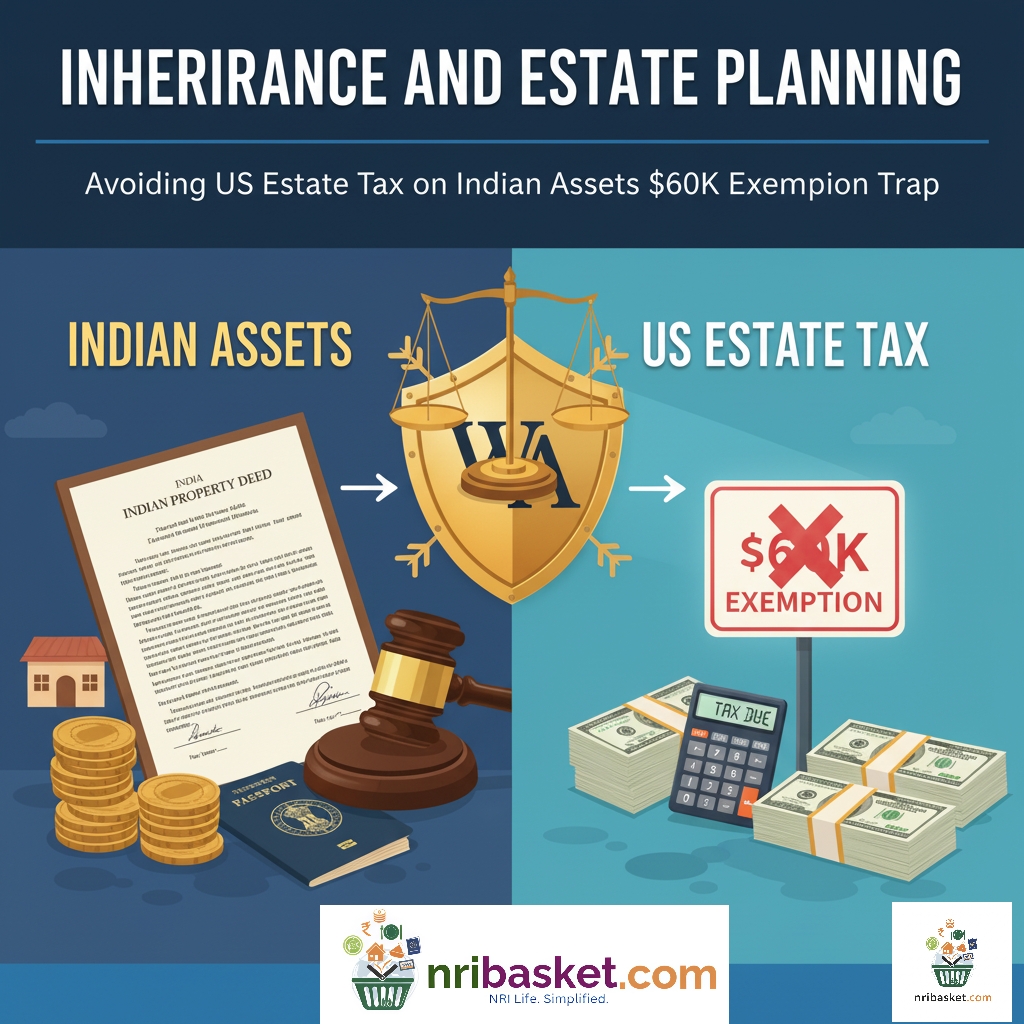
Oplus_16908288
Avoid the US estate tax “$60K exemption trap” on Indian assets with proper planning. Learn how estate tax applies to US NRIs, how Indian property is valued, what assets are taxed, and smart strategies like trusts and gifting to protect your family.
Long Answer: If you live in the US as a Green Card holder or resident for tax purposes, the IRS treats you like a US person. This means your global assets—including property, bank accounts, and investments in India—may be taxed when you pass away.
Long Answer: If an NRI who is NOT a US resident or citizen dies while owning US assets (stocks, real estate, etc.), only the first $60K value is tax-free. Everything above that can be taxed up to 40%. Many Indians misunderstand this and accidentally leave behind US assets to their heirs without proper planning.
Long Answer: The $60,000 exemption is only for non-US residents who die owning US assets. Indian assets like Indian property, Indian bank accounts, NRE/NRO deposits, and Indian stocks are NOT counted in this limit.
Long Answer: US residents and citizens get the full federal estate tax exemption (about $13.6M in 2024; reduces to ~ $6–7M in 2026). This applies to worldwide assets, including Indian property.
Long Answer: The US taxes worldwide estate assets of residents. That means your Indian house, NRE/NRO balance, gold, mutual funds, or inherited Indian property can all be included in your taxable estate.
Long Answer: India does not charge estate tax or inheritance tax. So Indian assets are tax-free when inherited. The issue mainly arises in the US because of US estate tax rules.
Long Answer: Many countries have estate tax treaties with the US, but India does not. This means Indian NRIs cannot claim treaty-based exemptions and must plan carefully to avoid unexpected estate tax.
Long Answer: For US residents, all worldwide financial accounts, including NRE/NRO/FCNR deposits, are included in the estate valuation. For non-US residents, these accounts are not US-situs, so not taxable.
Long Answer: India does not tax inheritances. However, before the US assets pass to children, the estate might owe US estate tax if the total value exceeds the allowed exemption.
Long Answer: Indian parents with no US connection face no US estate tax. But if they own US real estate or US stocks, the $60K exemption rule applies.
Long Answer: The IRS uses property valuation converted at the exchange rate on the date of death. Estate planners often use independent valuation reports from India.
Long Answer: Gifting assets during your lifetime reduces the size of your taxable estate. You may need to file Form 709, but gifting Indian assets can reduce future estate tax exposure.
Long Answer: India does not tax gifts to relatives. However, if you’re a US resident, large gifts must be reported on Form 709, though no tax is typically due unless you exceed the lifetime exemption.
Long Answer: The child must report the foreign inheritance on Form 3520 if the value exceeds $100,000. The inheritance itself is not taxed.
Long Answer: Gold held by a US resident at death is included in their estate value. If inherited from a non-resident, it’s tax-free but may require reporting by the heir.
Long Answer: They are part of the US resident’s worldwide estate. Their value contributes to the total estate and may trigger estate tax if above exemption.
Long Answer: For estate tax, only the deceased person’s share of the joint asset is included in the taxable estate. Proper documentation is important.
Long Answer: Placing Indian assets into a foreign trust or irrevocable trust may remove them from the estate. Trust planning must follow US and Indian laws, so professional guidance is essential.
Long Answer: The US includes all foreign retirement accounts in estate valuation for residents. For non-residents, these are not US assets, so estate tax doesn’t apply.
Long Answer: Nominees in India only simplify transfer. The IRS still includes the asset in the deceased’s estate for US tax purposes.
Long Answer: If the deceased owned the policy, its value is included in the estate. Using an ILIT (Irrevocable Life Insurance Trust) can keep it outside the taxable estate.
Long Answer: A dedicated Indian Will for Indian property simplifies probate and transfer. It does not directly change US estate tax calculation, but reduces legal hurdles.
Long Answer: If you gift or transfer assets before becoming a US resident for tax purposes, the assets may remain outside the US estate tax system.
Long Answer: POA only gives authority to act; it does not change ownership. Estate tax depends on ownership, not who manages the asset.
Long Answer: India will not tax the inheritance. But the IRS requires these values to be part of the US estate tax filing.
Long Answer: US tax applies only when the US-based heir sells the inherited property. The sale is taxed as capital gains, using stepped-up basis rules in many cases.
Long Answer: Strategies include avoiding holding US real estate personally, gifting assets early, moving investments to non-US assets, or using structures like LLCs or trusts (with legal guidance).
Long Answer: Non-US residents holding US stocks face estate tax over $60K. Many prefer holding through foreign ETFs or funds that are not US-situs assets.
Long Answer: Once you officially give up residency and meet US tax exit rules, worldwide estate rules no longer apply. Only US assets may be taxed under the $60K exemption.
Long Answer: Use Wills in both countries, consider trusts, track asset valuations, avoid unnecessary US-situs assets, and plan gifts early. A cross-border estate planner ensures proper US-India coordination.
US estate tax for Indian NRIs, India-US estate tax rules, $60K exemption trap, Indian assets estate planning, NRI inheritance tax USA, US tax on Indian property after death, estate tax planning for NRIs.




